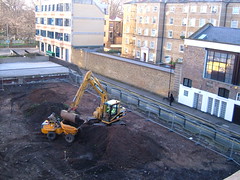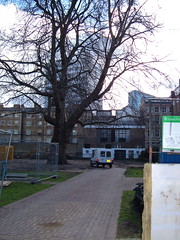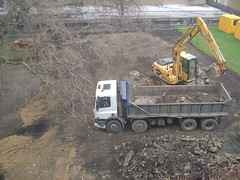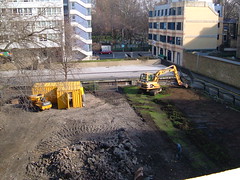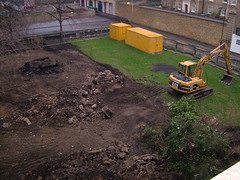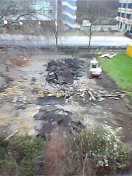Until this week there was a playground here. You may be able just to make out the yellow seats of a see-saw, slightly to the left of the centre of the picture. But on Monday the sounds of innocent play mingled with the incipient bullying of older children were replaced by buzz saws and diggers.
This is the view out of my window, and over the next four months I shall have to get used to a different aural landscape. The good news is that when the work is over — in June or July — we'll have an even better public space, including a 'quiet garden' under the beautiful old plane tree (some branches of which are visible on the left of the picture). Here's a
plan of how it's intended to be laid out (the window from which the picture was taken is about a third of the way up the left-hand side of the plan).
The area in the foreground has been in Quaker ownership since 1661, and, between then and 1855, 12,000 people were buried here in unmarked graves, including George Fox, founder of the movement (see
more details). In fact, the area had already been used for burials before that, the name Bunhill being derived from 'Bone Hill'.
In the top right of the picture, between the buildings, you can see Bunhill Fields burial ground. This ground, unconsecrated by the Church of England, was used for burials from 1315 to 1854, and is the resting place for many religious non-conformists and freethinkers who were not welcome in church cemeteries: William Blake, Daniel Defoe, John Bunyan and Susanna Wesley are buried here. John Wesley, founder of the Methodist Church, is buried just the other side of Bunhill Fields in
Wesley's Chapel. Here's a
wonderful walking tour of the area, including its history and some good photographs.
To my shame, I was only vaguely aware of the Quaker heritage of this area until we got a leaflet about the changes to Quaker Gardens yesterday. The
Bunhill Fields Quakers are still active at the
Friends Meeting House just behind our building. We will join them one day.
I love being enfolded in the legacy of pacifism and radicalism: these bones surely make fertile ground for new life.
